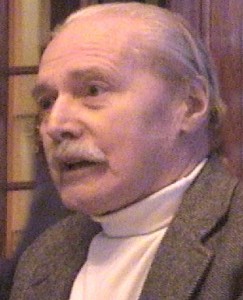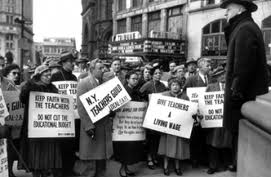At Seward Park High School I had now been promoted to the so-called “honors” track. This meant that instead of attending a normal, generic sort of English class, I was now enrolled in journalism and creative writing. The journalism class published the Seward World, our school newspaper, while the creative writing class was responsible for the literary magazine, The Folio. I wrote for both, but was much more active in journalism than I was in creative writing where I distinguished myself mostly for my acerbic criticism of the writings of my fellow students, while not producing anything better, although in greater quantity. I must admit that seeing my writings appear in print inThe Folio gave me great pleasure.
Journalism was all involving. The class was run by Miss Theresa Gloster, a make-up-free, serious, and plain looking woman in steel rimmed glasses, who was a wonder. She had a sister named Bidabee (I just loved that name!), who also taught at Seward, but who was nothing like my Miss Gloster.
We might have had a class text, but our real bible was “The Autobiography of Lincoln Steffens,” whom she worshipped for his brilliance, integrity and idealism, as well as for his vision of newspapers as a force for societal improvement. Each month, whatever the effort and the distractions, she had us write, edit and proofread a six to eight page newspaper about our school. I remember spending many long evenings, sometimes until 10 PM, with some of my classmates and Miss Gloster working on our current edition in our office. It was exhilarating to work with someone like this particular teacher. She was endlessly patient, absolutely fair, and never out of temper. She was also a genius at resolving the disagreements that inevitably flared while the dozen of us worked to make each issue as good as we knew how. Much of it depended on her favorite phrase with which she overcame all objections, “Yes, but. . . “, a phrase I remembered and that came to stand me in good stead later in life.
It was Miss Gloster who got me my first serious job, at the office of the New York Teachers Guild. She knew that I had held a series of jobs in grocery stores in the neighborhood (as well as at one florist), but I had not been happy with any of them, although the money was needed. I began working at the Teachers’ Guild, its office then on East 23rd Street, and the second largest teachers’ union in the city when there were no recognized teachers’ unions in New York. I became the mail clerk when I joined the Guild staff and worked after school hours. Miss Gloster was an active leader in the union, which at the time was led by Charlie Cogen. It was thrilling to work for a union, and to work as an equal with these adults who worked hard to improve the schools, the lives of their students, as well as the lives of all teachers and their families. It was exciting to be a part of the American Federation of Labor, of the labor movement that had worked so hard to improve the lives of most workers in the city, and as for teachers, that labor movement was just in its infancy, and I was part of it!




Had you gone to Wyoming and became best buddies with “Dead Eye” Dick Cheney you might have turned out to be conservative member of the GOP.
Geography determines much.
Correction:
Had you gone to Wyoming and become best buddies with “Dead Eye” Dick Cheney you might have become a conservative member of the GOP.
Geography determines much.
Alex – I fell like I’m reading the origins of your devotion to teaching English as an adult and it’s really exciting. Suddenly, I wish I had been one of your pupils – though perhaps in a different setting. I grew up very sub-urban – as you well know.
Amy, I had fantastic English teachers. Gloster was in a class by herself. I also had a Dr. McElroy who taught me how to extract cheerful work even from the unwilling without ruffling a feather. And yes, these were my inspirations, although I also had superlative teachers in college. I’ve just been very fortunate in the people I met along the way and who took an interest in my development. Yes, you would have felt very comfortable in any of my classes both in high school and in college. I loved having bright, challenging students, and they loved me. To give you an example: I was teaching in one of the most “troubled” schools in the city, and I had the toughest twelfth grade English class in that school, one regularly visited by parole officers. For fun, to show what could be done with such a class, I had them rise when I walked into class each morning, and sing out together, “Good morning, teacher, kind and true! A happy day we wish to you!” This was always led by the class president, a kid almost as tall as my 6’3” and who walked into class the first day wearing a black T-shirt that read, “Fuck Everybody!” My classes were fun for my students, but I had a good time also. When a substitute teacher was greeted in the same way on a day I was out, she panicked and ran down to the principal’s office.